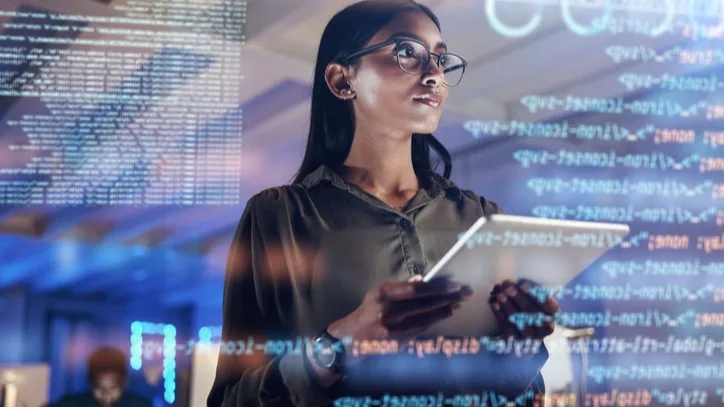
Overview
Jennifer Celio Li of Samsung, Mika Miyake of Garmin Health, and Nichole Young-Lin of Google share how women’s health startups can collaborate with Big Tech.
What Technology Heavy Hitters Look for in Femtech Partnerships
Big Tech is taking notice of the burgeoning FemTech market, which promises to transform women’s lives at all stages. Not long ago, the word FemTech might have been misheard as “fintech.” But the industry has come a long way. Of the record-breaking number of $2.6 billion in VC investment in women’s health in 2024, 38 percent focused on health tech.
Now, the technology heavy hitters are turning to startups to help fill opportunity gaps.Samsung, known for its wearables and smart TVs, fridges, and stoves, is leaning in on connected home applications for health and safety, said Jennifer Celio Li, who spearheads global partnerships in women's health and sleep for the company.
“From education to detection to guiding users to treatment or wellness solutions, to monitoring through that treatment or intervention, we’re looking for partners to fill the gaps along that user journey,” Li explained at the SiS New York Women’s Health conference held in May.
Google also seeks out partnerships with “new and exciting” startups, according to Nichole Young-Lin, MD, an obstetrician gynecologist who serves as Women's Health Clinical Lead for Google. And Garmin Health is open to collaborating with startups that incorporate Garmin devices into their solutions, said Mika Miyake, PhD, Business Development Manager at Garmin Health.
Here’s how to FemTech entrepreneurs can get their digital tools and innovations on the radar of these tech titans.
Start by saying hello
While Google, Garmin, or Samsung might be intimidating, they’re more approachable than founders might think. When you’re at a conference or event, don’t hesitate the initiate a conversation with a tech exec in an informal way.
Try to work multiple touch points. Meet someone during a networking break, reconnect once again later in the day and build a rapport. Miyake noted that conversations she had with a few startup founders at the SiS London event last October led to ongoing dialogues. And don’t forget the most basic touchpoint of all: a tech company’s contact form.
“Sometimes we get an inquiry through the website, and we start the conversation from there,” Miyake said.
Leverage the connections in your community
Founder communities, like HITLAB in New York, are another space where big companies go to meet emerging talent. At HITLAB, Li met the founder of Curio Digital Therapeutics, the only FDA-approved solution to treat anxiety and depression symptoms in postpartum women.
“Through multiple touch points, she met my manager, who's in charge of Global Partnerships for Samsung, and we linked up. Very quickly, in the span of a month, she was able to develop a proof of concept on our SDK (software development kit).”
While founders might join these communities to find camaraderie among like minds, they’re also high-value hubs of innovation for Big Tech. You may be pursuing them, but they’re also looking for you.
Go the research route
Two years ago, Garmin offered their first round of research grants in women's health with research partner Labfront. They selected five research projects, and now, these projects are moving toward commercialization. Committed to the women’s health sector, Garmin continues to offer a round of grants each year.
Young-Lin echoed that one of the best ways to start a relationship with Google is through research. With two grantees in recent years in maternal health, Google has begun to increase its focus on the women’s health sector.
Seek out corporate resources for startups
Young-Lin encouraged founders to look into accelerator programs, such as the recent AI for Health challenge. She also recommended founders working in AI to check out Google for Startups and to apply to the AI Futures Fund, “an initiative from Google to collaborate with and support founders building next-gen AI products with Gemini models.” Through the fund, founders gain access to Google researchers, UX designers and engineers.
“In these grant applications, we look for startups beyond the ideation phase that have a clear, well-defined product and demonstrated market traction,” Young-Lin said. “We want to make sure you have a customer pipeline, an established user base, or demonstrated market value.”
Apply to be considered for awards
Each year, Garmin holds the Garmin Health Summit, where it presents Garmin Health Awards to startups innovating with their devices or data. The Expert Award is named by a panel of four expert judges but last year, they added a People’s Choice Award, voted on by the event’s attendees.
The 2024 winner was Metluma, a menopause symptom tracker that allows women to identify symptoms and find solution. The significance of this win? The vast majority of attendees/voters were male. “They will never experience menopause themselves, but they still recognized the innovation in Metluma,” Miyake noted.
Be armed with tech know-how and market data
To partner with Google, being able to talk tech is a must.
“I have seen many startups fail in the application process because they don't demonstrate their technical expertise,” noted Young-Lin.
Google wants to know not just that you’re aware of their tools, but specifically how you’ll implement them. Founders should be ready to demonstrate evidence that their product has a real shot at success.
“Google is a very data-driven company, so come prepared with charts, graphs and numbers, as well as your projections. That’s how to convince Google to work with you,” said Young-Lin.
Above all, show your passion
Big Tech is looking for long-term, strategic relationships. Both Miyake and Young-Lin agreed that passion is a top trait in a startup partner — the commitment to making an impactful change in women's health.
“Especially when [the founders] have faced a problem themselves and they’re trying to solve it, that motivation comes through,” said Miyake. “We appreciate that.”








